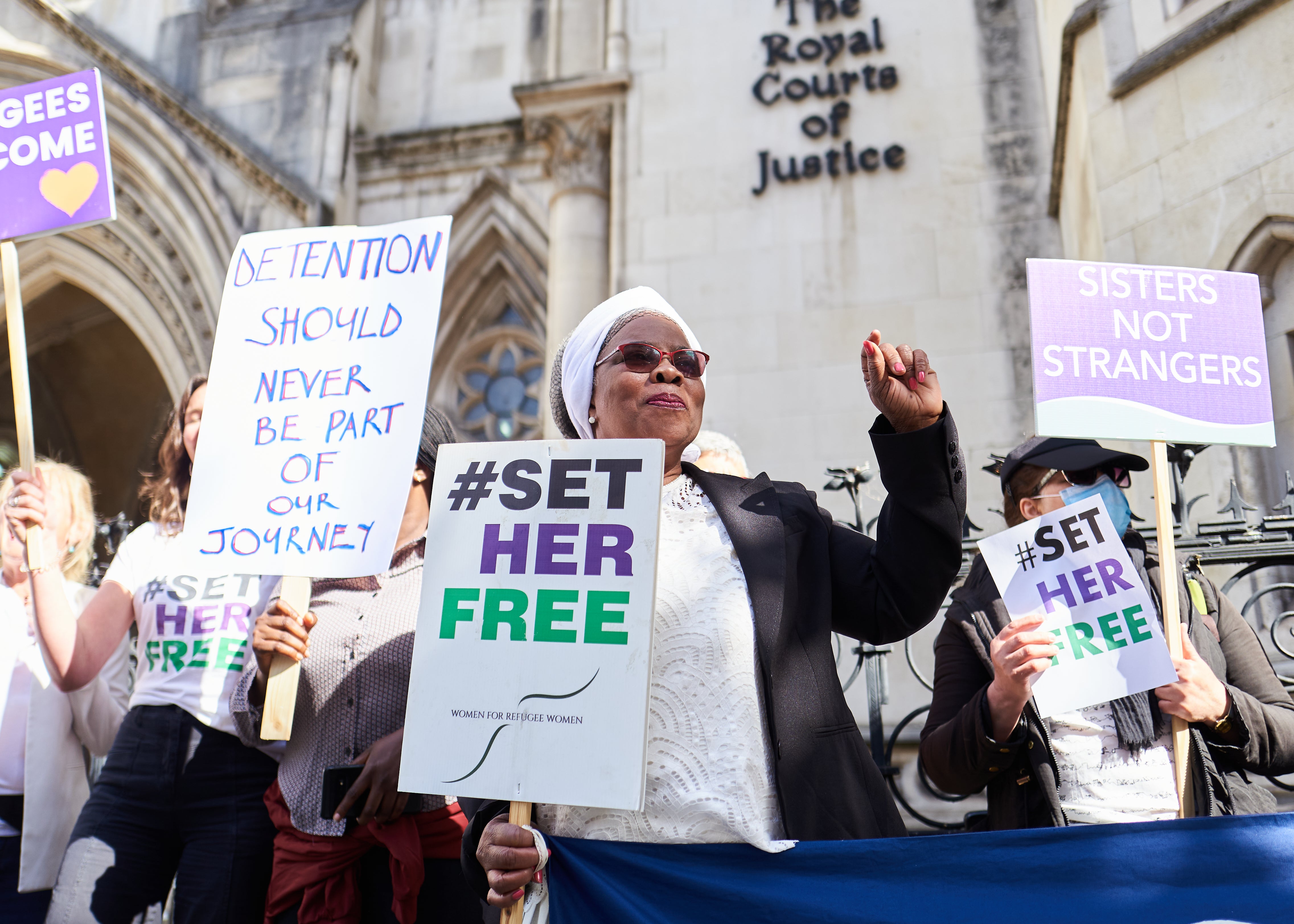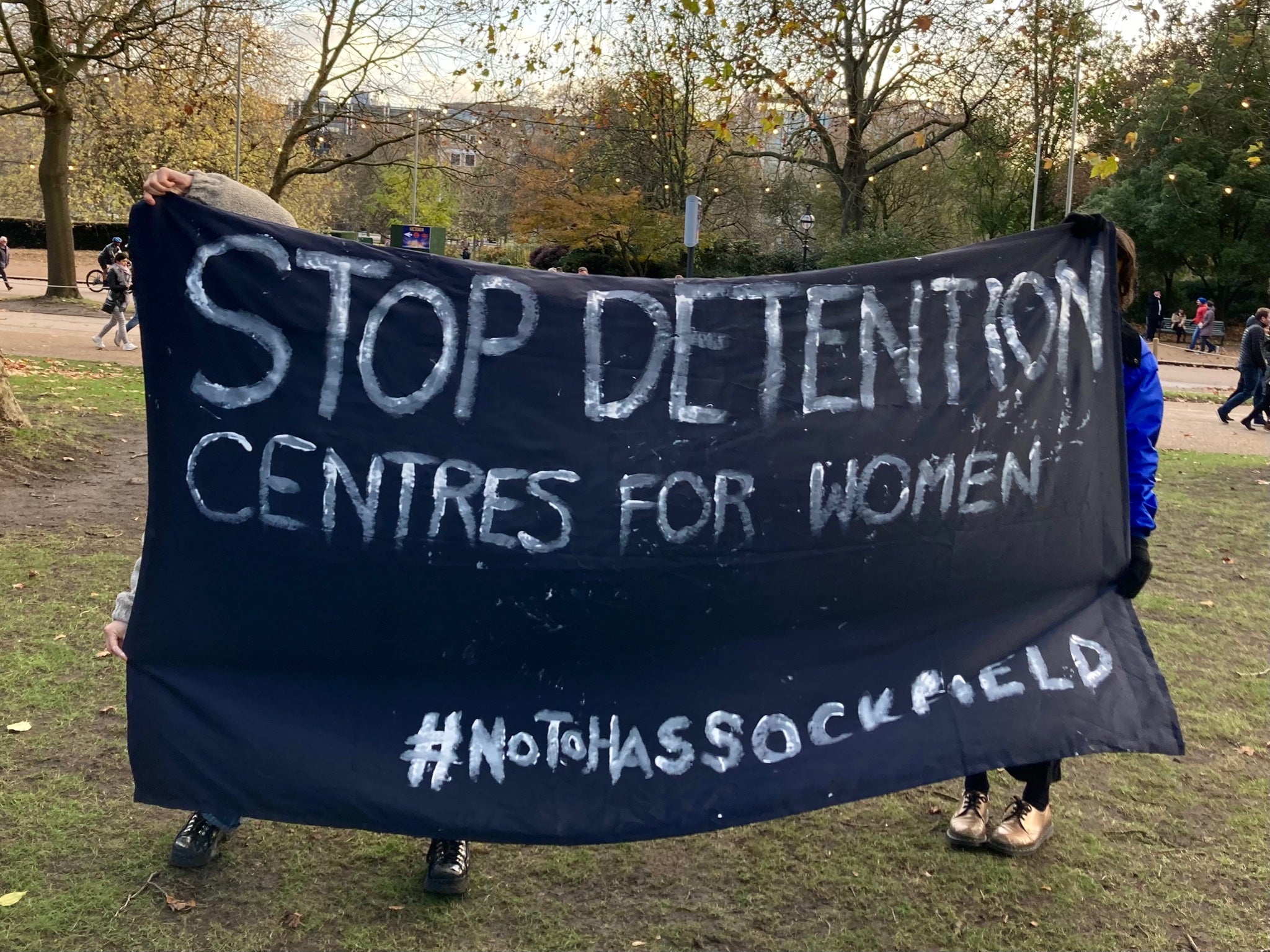Asylum seeker raped, shot and tortured was ‘unlawfully detained’ in immigration removal centre, court hears
High Court told that detention in woman-only centre currently unlawful because of lack of in-person legal advice

An asylum seeker who had been raped, shot and tortured was “falsely imprisoned” in an immigration detention centre by the British government, a court has heard.
The woman, who cannot be named for legal reasons, is bringing a legal challenge arguing that she and all other women held at Derwentside Immigration Removal Centre (IRC) have been unlawfully detained.
The High Court heard that the facility, in County Durham, has replaced Yarl’s Wood as the only all-female immigration removal centre in the UK and contains a mix of foreign offenders, failed asylum seekers and other women awaiting deportation.
The claimant, a South African woman known as SPM who was detained between 24 January to 25 February, is bringing the legal challenge alongside charity Women For Refugee Women.
SPM claimed asylum shortly after travelling to the UK on a visitor’s visa in February 2019, but was refused and had an appeal dismissed in November last year.
Her lawyers said a judge disbelieved her claims of gender-based violence and domestic abuse, including gang rape and forced prostitution, in South Africa.
Barrister Alex Goodman told the High Court that SPM was then detained unexpectedly during a routine appointment at an immigration reporting centre on 24 January, and told that she would be deported to South Africa.
The woman was sent to Derwentside IRC two days later, arriving at 2am, and started trying to seek legal advice. The court heard that a phone number provided by staff was not answered and they did not help her find a solicitor.
On 29 January, she asked her partner to bring in medication and batteries for her hearing aid, which the woman is said to have needed since being shot in the head by her abuser in South Africa.
SPM’s partner travelled to Derwentside IRC but was refused entry, resulting in the claimant being placed on suicide watch, still without legal assistance, the court heard.
She wrote to the Home Office herself appealing for it to reconsider her case on 31 January, but days later the government confirmed its decision to deport her to South Africa.
Mr Goodman said that a medical report conducted at the time by a doctor at Derwentside IRC found “a number of significant scars consistent with her account” of abuse before she fled to the UK.
They include a gunshot wound, a long scar from being stabbed in the abdomen and joint deformity from “other violence”.

Mr Goodman said the report concluded that she was likely to be a victim of domestic abuse and torture, and suffered from suicidal thoughts and experienced symptoms of psychotic episodes.
On 4 February, Women for Refugee Women put her in touch with solicitors but she had difficulties speaking to them by phone “because of her hearing problems and language barrier”, he added.
Lawyers were able to send a pre-action letter on her behalf two days later, resulting in the Home Office cancelling its removal directions.
On 10 February, she was referred into the National Referral Mechanism for identification as a victim of trafficking and has since been identified as a potential victim of modern slavery and released from immigration detention.
Mr Goodman told the court: “The Home Office acted ultra vires [beyond its legal powers] in detraining the claimant and others because the power is subject to retaining the right to access to justice, and the failure to retain that right results in the authority being taken from under the defendant’s feet.”
The barrister said the situation for the claimant and all other women in Derwentside IRC amounted to “false imprisonment”.
“The fundamental right of access to justice incorporates in some circumstances a right to access face-to-face legal advice,” he added.
“In-person legal advice is regularly available at all other, male-only, immigration removal centres. The [government’s] detention of women in circumstances in which they enjoy inferior access to justice is unfavourable treatment on grounds of sex and consequently is directly discriminatory and unlawful.”
A Home Office equality impact assessment published before women started being moved there in December said that legal services would be provided “on the same basis” as other centres, but the tendering process failed and Derwentside IRC started being used without in-person visits by lawyers.
The claimant’s lawyers said that advice still has to be provided remotely, mainly via telephone.
They argued that a “large proportion” of detained women are survivors of trauma, sexual violence and trafficking, and that in-person appointments are necessary to ensure they can disclose their experiences.
“The system is already a highly stressed one in which there are bound to be cases where individuals do not have access to justice,” Mr Goodman said.
“There will be trafficking victims and other vulnerable individuals who won't be picked up.”
The claimants are seeking a formal declaration that the government is detaining women unlawfully at Derwentside IRC and prohibit the centre’s use under the current arrangements.
They are also seeking damages over false imprisonment and breaches of human rights and equality laws for SPM.
Lawyers for the Home Office said four providers had bid to provide legal services at Derwentside IRC under the Detained Duty Advice Scheme but they did not meet official requirements and the tender process was stopped.
It offered contracts to three bidders on 17 June, when the legal challenge was already underway.
Legal documents filed by the Home Office said it would be a “remarkable step” for the High Court to declare the home secretary has no power to detain women at Derwentside IRC.
“The court is essentially being asked to close Derwentside down until and unless the Legal Aid Agency puts into effect a default arrangement for all advice given there to be face-to-face advice,” it added.
“It is not accepted that the arrangements at Derwentside are such as to give rise to a real risk of a denial of access to justice…the Secretary of State does not, by detaining women at Derwentside, treat them less favourably than she treats the men whom she detains elsewhere.”
The Home Office denied that detention at the centre is unlawful and is calling for the claim to be dismissed. The hearing, before Mrs Justice Lang, continues. Judgment is expected to be reserved until a later date.
Join our commenting forum
Join thought-provoking conversations, follow other Independent readers and see their replies
Comments


Bookmark popover
Removed from bookmarks